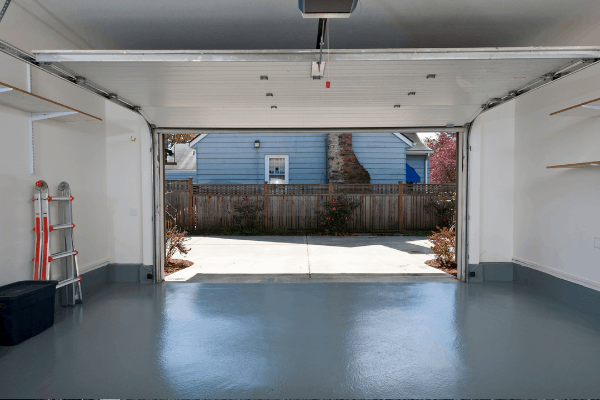Whether you are building a stand-alone recording studio or modifying a room in an existing structure for that purpose, flooring material will be a question. Which type of floor has the best acoustic properties, for instance.
A concrete floor recording studio is a viable option because the reflective properties of concrete for high-, medium-, and low-frequency sound waves help achieve a more natural sound. When combined with walls and ceilings that are acoustically treated, a concrete floor is a good fit.
Read on to learn more about why concrete flooring is an option worth considering when setting up a recording studio.

Understanding the Acoustical Properties of Concrete
To properly evaluate the merits of a concrete floor recording studio, you first need to understand the acoustic properties of concrete.
Concrete has highly reflective properties when it comes to a broad spectrum of sound waves. At first reading this, you might have doubts about using anything so acoustically reflective in a recording studio. After all, wouldn’t that create unwanted reverberations?
Concrete Floor Recording Studios and Sound Reverberation
Concrete is prone to create more sound reverberations—much as other hard surfaces such as hardwood floors. For this reason, concrete walls and ceilings that are not treated for acoustics are usually not recommended for a recording studio.
However, when it comes to flooring, you need to consider the benefits that you can derive from a hard surface such as concrete. Reverberations emanating upward are not like reverberations being reflected off walls and ceilings. A reflective floor can create a livelier and more natural sound.
Provided that the walls and ceilings are designed or treated for acoustic optimization, a reflective floor can create a natural sound that is still controllable. In other words, the acoustic properties of a recording studio with a concrete floor would be such that it will avoid what is commonly referred to as a “dead room.”
So, if you have a preference for recording in a dry or dead room, then a concrete floor would not be a proper choice for you.
Check out my article on decreasing echo in a room with hardwood floors.
Concrete Floors Prevent the Low-Pass Filter Effect
Softer flooring options, such as carpeting and some vinyl floor coverings, tend to create a low-pass filter effect.
A low pass-filter in acoustics is when high- and medium-end sound waves get absorbed, and low-end sound waves are reflected back almost intact. This dynamic creates a bassy and booming effect. Both of these are properties that are usually not desired in a recording environment.
Concrete and its fully reflective properties eliminate the low-pass filter effect.
When a Concrete Floor’s Reverberation Works Against You
Yes, the reflective acoustics of a concrete floor can be ideal for creating a livelier sound in a recording studio. However, there are conditions when a concrete floor could work against you instead of achieving a desirable outcome.
The negative impact of a concrete floor in a recording studio usually comes down to the size of the space used. The smaller the area, the less optimal a concrete floor would be.
Concrete Flooring Combined With Low Ceilings
In a recording studio, concrete floors combined with a low ceiling will require greater attention on the acoustic treatment of the ceiling. The reflection coming off a concrete floor combined with a ceiling less than ten feet (3.05 meters) in height will create issues such as frequency cancellation.
Ideally, a ceiling height of 14 feet or higher would be best, but an adequately treated ten-foot ceiling would work well with a concrete floor. Keep in mind that most home ceilings usually fall below the ten-foot mark.
Concrete Flooring Combined With Small Spaces
It is not that larger spaces automatically bring about improved acoustics. It is more of an issue of smaller spaces having smaller margins for acoustical adjustment.
The result of having a concrete floor in a small room intended to function as a recording studio means that, once again, the best attribute of a concrete floor becomes its main foil. In a small space, the increase in reverberations across all frequencies from the floor can be overwhelming from a sound recording perspective.
A room that is 10 feet by 15 feet (3.05 meters by 4.6 meters), for example, would require more acoustic treatment on the walls due to the concrete floor than it otherwise might require. The extent of that acoustical treatment would depend further on the wall material and the height of the ceiling.
Check out my article on the ideal flooring for home based recording studios.
Determining the Ideal Size for a Concrete Floor Recording Studio
When you start talking about “ideal” sizes for a recording studio, you should never forget that such information will be highly subjective.
Too many factors come into play to realistically provide a static answer. However, when it comes to recording studios with concrete floors, there is a baseline that you can consider for optimal results.
- Width of 17.5 feet (5.33 meters)
- Length of 23 feet (7 meters)
- Height of 10 feet (3.05 meters)
These dimensions can be used as the minimum for obtaining the maximum benefits of a concrete floor in a recording studio. Please note, I said minimums. With recording studios, especially when concrete floors are involved, the larger the space, the more acoustic options you will have.
Having a space with one or more dimensions smaller than the baseline mentioned above should not preclude you from considering a concrete floor for the studio. You should be aware that deviating from those baselines will negatively impact the benefits of the concrete flooring.
It means that if you are building a small recording studio inside your home, a concrete floor would be ideal, provided the allocation of space for your studio is adequate. Otherwise, be ready to employ more treatments on your walls and ceilings than you otherwise would.
Check out my article on cheap recording studio flooring alternatives.
Determining if a Concrete Floor Is Right for Your Recording Studio
A concrete floor is a good fit for a recording studio due to the benefits it offers. Preventing the low-pass filter effect can improve the overall quality of a recording.
However, practicality and viability don’t always intersect. For example, you may want to have the benefits of a concrete floor recording studio, but you are currently limited to using space that you are leasing and that does not have a concrete floor.
Your budget may be limited to a degree where changing a structure’s flooring is not possible, even if you own the property. Local building codes, engineering realities, etc., can all negate your desire to put in a concrete floor in your recording studio.
There are countless practical reasons why a concrete floor may not be viable for your immediate situation. However, that does not take away from the benefits that you could obtain from a concrete floor recording studio. Even if a concrete floor is not viable for you today, its viability as an optimal flooring surface should stay in your long-term plans as your situation changes.
Be proactive with your knowledge of the attributes of concrete flooring in a recording studio. If you have not yet leased or purchased a location for your studio, keep in mind the ideal minimum dimensions described in the prior section. Use that information when conducting your search for space.
Also, if you are considering modifying an existing room in your home or retrofitting a garage or other structure, consider the benefits and potential extra costs of concrete flooring in your budgeting.
For more information, check out my comprehensive guide to Garage Recording Studio costs.
Conclusion
For acoustic reasons, a concrete floor can be seen as one of the best flooring options for a recording studio. However, the choice of concrete requires specific minimum space and ceiling dimensions to receive the optimal acoustic benefit.
For more information, check out my article about whether basements are suitable for setting up recording studios.
Sources
- Musician on a Mission: Home Studio Recording Setup
- E-Home Recording Studio: How to Set Up Your Recording Room
- Range of Sounds: Best Flooring for Recording Studios
- Concrete Construction: Soundproofing With Concrete
- Lenard Audio Institute: Acoustics
- Audient: How To Build a Recording Studio
- ResearchGate: Active Low-Frequency Modal Noise Cancellation for Room Acoustics: an Experimental Study
- Sweetwater: Top 10 Things You Should Know Before Building a Studio
- Research Gate: Effects of Low-Pass Filtering on Acoustic Analysis of Voice
Recent Posts
QuickTime is a vital app for many Mac users, and if you’ve recently bought a new microphone, you might wonder how to use it optimally. QuickTime cannot record audio content if it doesn’t have...
Every microphone leaves a unique signature on the quality of its output. If you’re a podcaster trying to melt your way into your audience’s hearts, a muddy, distorted recording won’t cut it....
